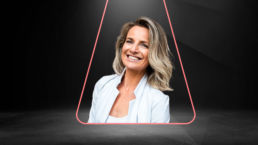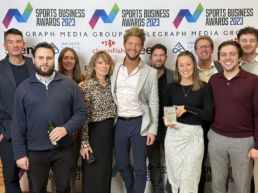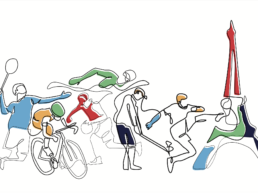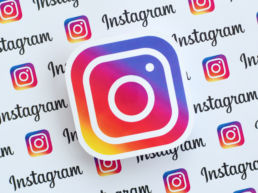Welcome to Redtorch’s She Moves The Game Spotlight Series, where we shine the light on the incredible women working in sport (find out more here).
We caught up with Lucy Mills, hailing from Portsmouth, Lucy is health and fitness fanatic and as she would describe herself, ‘your biggest fan’. Working on some of the biggest sporting events in the world, Lucy dons a variety of hats including producer, casting director and live sport events presenter.
We’ll learn about how she got to where she is today and her thoughts on the ever-evolving world of women’s sport.
Let’s start at the beginning … can you tell us more about your journey to where you are now?
It all began when I was 17 and obsessed with the media industry, especially anything to do with music and bands. Fearne Cotton was an inspiration to me – I wanted to be ‘amazing’ like her.
At college, a couple of my male friends were in a band called Speed the Collapse. I couldn’t help noticing they didn’t really seem to push themselves enough. That’s when I thought, Right, I’m gonna make myself designated band manager here! I’d do promotions in the canteen, sell tickets to their concerts, put on Battle of the Bands at local venues. There are loads of venues in Portsmouth where I grew up and it’s a really poppy city for music culture. Basically, everyone just knew me as Lucy Mills, the person always pestering people, trying to get five pounds from everyone to go to some local gig.
When I started working for Express FM, a local radio station, I didn’t really know how to do anything! But I did know how important it was at least to be in the room and absorb what was going on. It all spiralled from there although someone did once tell me that I shouldn’t have gone to university, because if I’d carried on with what I was doing I’d have been on a fast-track route given the popularity of radio and podcasts.
You talk about ‘being in the room’. Was a lot of the stuff you were working on male-dominated? Were there other women in the room? How did you find that?
On the whole, men did nearly all the day-to-day stuff. There were probably one or two women and it’s interesting that a woman managed the radio station. Even though she wasn’t always physically present, she was a champion for the brand. Actually, this is the first time I’ve reflected on that; knowing there was a powerful woman in charge must have provided a significant role model for me.
My Dad’s in the military, so part of my upbringing was having adult conversations with lots of different people. This enabled me to develop relationships quite easily, and be very honest about telling people I wanted to work in the media. It was really exciting.
Did you come across any challenges along the way?
There was one experience when I was faced with a bit of a brick wall which prevented me from presenting for a very, very long time.
I’d managed to get a job as a runner with NBC News for the royal wedding and off the back of that had an internship with Blue Peter when I was 18. One of the producers asked me, “Oh, what is it that you want to do?” Before I’d even had the chance to say, “I’d love to be a presenter,” they said, “Everyone always says presenter, so don’t say that.”
This made me feel I should never say such a thing. None of us understand at the time how something said to a young person can have such a profound effect, and what it means to be able to express a path of interest without fear of judgement. From that moment on, I didn’t tell anyone of my fantasy of becoming a presenter.
When I went to university to read Media and English Literature, I knew I needed to work hard and wasn’t interested in going out and getting drunk (although I obviously did!) It might sound a bit sad, but I thought, Fair enough, I’ll take from university what I need to learn and to grow.
I basically spent the next 14 years expanding my production experience, to the point where I no longer wanted to deny my passion to be on camera. I felt the performance element, such as dancing and drama, came from my background and could be ticked off in a big way.
I hope this is now my own platform, somewhere I can say to myself, “Right, Lucy, this is your happy place. You’re able to communicate what you need to, but you’ll always be learning.”
What are some of the most significant milestones and achievements in your career? No matter how big or small, something that relates to you personally, that says, “I’m keeping younger Lucy happy.”
That’s such a lovely question because I didn’t realise until later how important it was to keep younger Lucy happy! Working at the Olympics is one of the biggest, bestest things in the world. It’s so addictive that my personal career trajectory and plan in life is to get to the next Games and the one after that and the one after that! I’m incredibly fortunate to have got a role at my first Olympics – that experience in itself was just so unique. It taught me that if you have an option, you need to be able to fill it but also to see when things might need changing as you are in a position to do something about it.
Being able to say I’ve worked at four Olympics (London 2012, Sochi 2014, PyeongChang 2018, Tokyo 2020) and been invited to six is brilliant. I turned down Rio 2016 as I’d been offered the most incredible opportunity to move to London and work at VICE. I turned down Beijing 2022 as I was embarking on another aspect of the hybrid sort of world I inhabit – here I do talent booking, as well as presenting.
Being a woman in a traditionally male-dominated industry, are there any barriers you need to overcome in your day-to-day world?
At the moment, I am concerned about lacking credibility, maybe a bit of impostor syndrome. Despite working in the production world and always being invested in my own sporting fitness and health, I don’t actually know what my credibility is, whether I’m able to talk about certain topics.
Men don’t often seem to have an issue with credibility. But it’s definitely a learning process I’m currently working on and through. I know a lot of people meet me and think, Oh, she’s really confident, but there’s a filter all the time that’s checking if what I’m saying is right or wrong. Sometimes, I put barriers in place myself!
I’ve got a quote on my website: “Lucy, you give yourself the green light, GO. GO. FOR. YOUR. LIFE.” Growing up I was quite reserved, but now in my 30s I say to myself, No, Lucy, give yourself the permission, what are you waiting for? Lots of people have this problem, especially if they’ve been raised in a particular way, in a military background like me for example, where you’re told to speak only when you’re spoken to, for example. How do you release those chains without worrying too much about being judged?
At the moment, I’m quite interested in developing my journalism, especially in the sporting world, because I’m known for being high energy and having a certain type of personality. I work for different sports that all want a slightly different tone. As with social media right now, it’s like wearing your heart on your sleeve. It’s difficult to navigate, to know if it’s too much, and being afraid of what might prevent you from future opportunities. That’s a point of contention.
What do you think the future holds for younger women?
I am very, very conscious of learning from my younger friends, especially Gen Z. I’m empowered by them and how much they champion each other. Putting a spotlight on women has been lacking, probably because it’s such a male-dominated press culture.
Media outlets picked on women so much that you don’t often realise they’re doing it. Your subconscious becomes filtered based on what they’re saying, their judgments. But I’m excited by what will come from the world of TikTok, Gen Z and future generations. I hope more women come into the industry. Someone pointed out to me recently that there aren’t many women presenters. Actually there are, but they’re not necessarily well represented.
Some decision makers say there’s a ratio of men to women that has to exist. People might believe that’s not the case and the really big names you can probably count on one hand. But working at the 2023 UCI Cycling World Championships, you could see if you start localised with your experience, building a profile you then go onto bigger things!
What key skill would you encourage women working in sport to use?
Women shouldn’t feel they can’t use their emotions. They can still raise their voice or cry while making a professional decision.
Part of my energy is that I’m very emotion-led. I did a qualification in documentary filmmaking and feel that’s how I’ve been able to see and make sense of the world. Most of my decisions are probably emotion-led; in fact, male managers have often commented on it. As in, “You need to take out the emotion from x, y, right?”
I take this onboard, but I’d say that we women should really lean into that emotional integrity as a force to be reckoned with! Without any emotion, decisions can go wrong – it’s important to find the right balance between a professionally led decision and an emotionally led one.
Did you find it difficult or awkward when you were first on camera? Do you have any advice for women wanting to get in front of the camera?
I did, because it was completely unnatural and no one was directing you on how or what to do. It takes time to gain confidence. I actually invested in a presenter school as I thought that’s what everyone had to do. It ended up being a huge learning experience, but I wouldn’t recommend it as it was very expensive, far too old-fashioned, and just didn’t sit well with me.
There are moments I think, Oh, what’s going on? You need to be hyper-aware, especially in live events when there might be 7,000 people around you, and a camera right in front of you. But it’s about learning the chemistry between you and the camera lens, knowing that’s what is connecting you to the world. There’s a huge difference between being an influencer, for example, and presenting on camera or at live events. You might not necessarily have the experience but at the same time, why not just go for it?
Back to the question! Between 2015 and 2020 I worked on a competition called Tribal Clash, a global functional fitness format which by 2020, pre-covid, was way ahead of its time in terms of event and brand! In the earlier years I was encouraged to experiment on stuff like their social media as there was no fixed social media position or role at the time. Mostly it was shoddy Instagram: at the time no one generally in society seemed to care so much about the aesthetics, there were no filters, and it was me figuring out the voice of the brand, how to engage with the followers. It’s impossible to keep everybody happy, of course, but so long as the people who hired you are satisfied then that’s great and by 2020 our final ever competition before covid, we produced the most stunning social content announcing the world series, that unfortunately never happened due to covid, but its amazing to think that over that 5 years period, we achieved so much!
We’ve seen incredible investment in women’s sport these past few years and with that it’s become far more popular. Do you think the current progress will continue?
I love that you’ve raised this because I feel that with the rise in investment, women’s sport will become one of the biggest revenue builders. I hope you don’t mind me sharing some figures I’ve brought with me from the Business Case for Women’s Sports Podcast. A new report from Deloitte (December 2023) predicts women’s professional sports in 2024 will generate over $1 billion in global revenue for the first time ever. The industry saw revenue of $695 million in 2022 and that figure increased by almost $300 million in 2023. It’s now projected to reach $1.28 billion in 2024.
So my question is: these numbers sound really impressive but what are the figures from men’s sport? I can’t guarantee that the following stats are necessarily only men, but in 2022 sport industry revenue worldwide was $486.61 billion. If you subtract the women’s revenue in the same year, a mere $695 million doesn’t even make a dent, does it? And that gives me shivers.
Where do you see the biggest potential in women’s sport?
A lot of people say women’s sport shouldn’t be seen as a separate entity. But we need to see the growth in the women’s field so brands know where they can invest in athletes and social media. I wholeheartedly believe that, as an athlete, you’re focused on that sport and shouldn’t be forced into getting into things like social media or being on camera; you might not want to, it’s not what you signed up to. A brand should see an athlete as an incredible, winning champion. Invest in them and do the social media for them; talk to them to find the right balance, get someone to run it for them so the brand has no problem with the credibility of that voice. That’s how I view the world and how it should work.
We clearly see the growth in interest in women’s sport, where do you see women’s sport in the next 2, 3, 5 years?
A big part of me thinks it can only get better from now as the last year has just been super exciting. It’s hard to judge when sports are so different yet they’re compared to one another. Football has had phenomenal media success but it’s impossible to compare it with extreme sports, for example, which has a totally different level of global spotlight, a totally different audience. I really believe, however, that women’s sport will continue to inspire, and get bigger and better, to the point where I’m watching Sky Sports News and it’s not all about football, but BMX as well.
I sincerely hope that grassroots and community-level sports continue to grow and get more focus, attention and care – childhood is everything. I hope the rise of women’s sport goes full circle and returns the success and revenue back to the entry level opportunities that exist and creates more! I see it with England netball doing incredible things to embrace children as well as women and men who want to return to the sport or try out something new. I witness this, too, in the rise of interest in health and fitness. There are so many different ways of getting people moving, such as HYROX, CrossFit. They’re getting bigger and better so it looks like there’s only one way forward.
Over the next five years, I think there will be increased exposure, interest and investment in women’s sport from both men and women. I love seeing men watching women’s sport. OK, you might go to a basketball or rugby game where the women play first and the stadium is pretty empty. But if you watch two outstanding matches, you’re getting more for your money.
What do you say to people who say women’s sport isn’t as good as men?
Well, it’s a pretty weak response. I remember – I think it was during PyeongChang 2018
– when there was an issue with snowboards for whatever reason the broadcaster’s were putting their weight on the stats on the lower third. How is that relevant? It’s not! I check little things like that now, what is different about the way we are broadcasting women’s sport to men’s. The recent 2024 X Games blew me away. I wanted to see some of our amazing snowboarders like Mia Brooks (who took an iconic gold) so had to watch it in the middle of the night in the UK and scrolls on the gram! Nevertheless, since the American Jamie Anderson totally annihilated the opposition at Sochi 2014, the progress in media coverage is just amazing – and it’s goodbye to the days of weak journalism.
And finally … do you have any career advice for women wanting to get into the sports industry or for those already in it?
I don’t think any of us actually get to the point of being a complete expert, however successful we might be. Athletes might be an expert in their individual field but personally I don’t feel I’m an expert at anything. That’s probably because I know that you have to keep learning; if you’re not, how can you remain passionate? If you started something when you were younger, and it’s a calling, carry on doing it. I grew up as a dancer, I played hockey, I had loads of interests and now adult Lucy wants to keep that variety. It’s one of the key aspects of my life, I’m constantly ready for whatever life throws at me. The messaging is so important: get out of your comfort zone and prepare for different situations. Like right now, I travel round the UK with BabyBlu my BMX, which has become a new hobby since the 2023 UCI Cycling World Championships.
We hope you enjoyed hearing from Lucy as much as we did interviewing with her. Her vast background and involvement in sport, particularly her championing of female athletes is inspiring and exactly what we aim to achieve with She Moves The Game.
If you want to learn more about Lucy and all the exciting things she gets up to in her day-to-day life, take a look at her website, Instagram or newly launch YouTube channel.
Keep an eye out on our website and LinkedIn as we continue to highlight extraordinary women in sport through She Moves The Game.
Redtorch is a global research, content & creative agency that makes sport more relevant to more people. Click here to find out more about our work.
Jess Reus
I am a food-loving, dog-appreciating, hockey player.
My most memorable sporting moment is…
Full on face planting on the Spine Ramp at FISE Montpellier in front of a crowd of 6,000 people and a load of professional Skateboarders...
I am happiest when …
I have food in my mouth.
The sports person that best represents me is …
Kate Richardson-Walsh.
The three things at the top of my bucket list are …
1. Travel around China and Japan
2. Meet Trixie Mattel
3. Learn a second language
A quote I live my life by is …
“They say I'm the Hottest MC in the Game. If you label me that, I will live up to it. Trust me.” – Lil Wayne.





